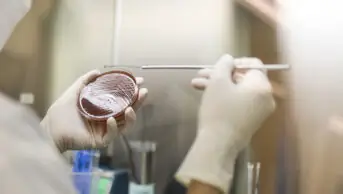
Shutterstock.com
NHS England has halted work to roll out a nationally funded pilot to refer patients to community pharmacists for treatment of uncomplicated lower urinary tract infections, owing to concerns around antimicrobial resistance (AMR).
Instead, NHS England and NHS Improvement’s AMR programme board has recommended that commissioners risk assess existing locally-commissioned community pharmacy services that use patient group directions (PGDs) to supply antibiotics to all patients.
A framework for these risk assessments, drafted on 29 April 2022 and seen by The Pharmaceutical Journal, said that the AMR programme board had reviewed a proposal for a “pilot to develop an enhanced service following a community pharmacy consultation service (CPCS) referral to a community pharmacy to supply antimicrobials to treat uncomplicated lower urinary tract infection in women ages 16 [to] 50 years” in December 2021.
However, “members of the board expressed concern about the risk of increasing the unnecessary use of antimicrobials and the resulting impact on AMR” and made a recommendation to “halt further work on a Pharmacy Integration Fund (PhIF) pilot”.
The proposal for the pilot was submitted by the Pharmacy Integration Programme, with funding from the PhIF, which is currently financing other community pharmacy pilots, including the routine monitoring and supply of oral contraception.
In the meantime, “the programme board recommended that commissioners carry out a risk assessment of existing locally-commissioned community pharmacy services using antibiotic PGDs, including consideration of the impact on general practice and urgent and emergency care services if antimicrobial PGDs were de-commissioned,” the document continues.
The framework — which is signed by Steve Powis, national medical director, and David Webb, chief pharmaceutical officer for England — sets out a list of 14 patient safety and public health risks potentially associated with supplying antibiotics through a PGD, and advises commissioners to implement service requirements “to reduce risk to a tolerable level”.
These include requiring pharmacists to follow up with patients who are supplied antibiotics “after seven to ten days” to record a clinical outcome and any further healthcare resource used.
Community pharmacies in the NHS Midlands region had been banned from signing up to provide a regionally-commissioned minor ailments service over AMR concerns in January 2022.
The ban was later lifted in June 2022, after the service’s PGDs were renewed and a new service specification was implemented that required pharmacists to follow up with patients after seven days “to allow collection of information on what happened to the patient” after using the service, according to the South Staffordshire Local Pharmacy Committee website.
Stephen Noble, chief officer of Dudley Local Pharmaceutical Committee, said that having this requirement “was the only way we could continue with the service by supplying antibiotics”, adding that additional funding is offered to provide the follow up appointments.
In an appendix to the framework, summarising recommendations made after reviewing the urinary tract infection service proposal, the board also advised commissioning research “to evaluate the quality, safety, effectiveness and appropriateness of new and existing clinical services provided by community pharmacies” where antimicrobials are supplied without a prescription under a PGD “in comparison to infection management by a medical or non-medical prescriber”.
The board also put forward a recommendation “to pause new services until this research has been undertaken”.
The number of antibiotic-resistant bloodstream infections in England fell between 2019 and 2020, the first time since 2016, although this was likely owing to social distancing and hand washing measures during the COVID-19 pandemic, the UK Health Security Agency said in November 2021.
A spokesperson from NHS England confirmed the framework document for risk assessments was correct, but was not able to supply comment in time for publication.


